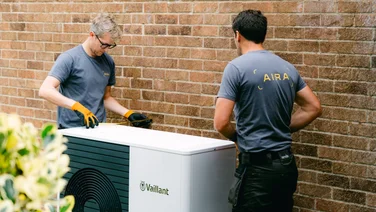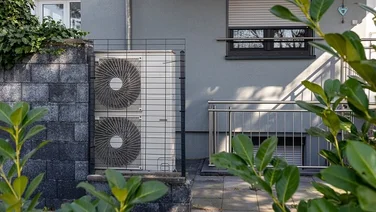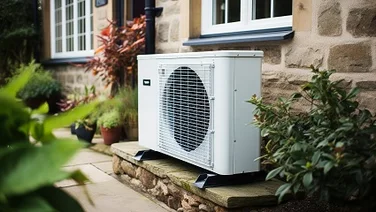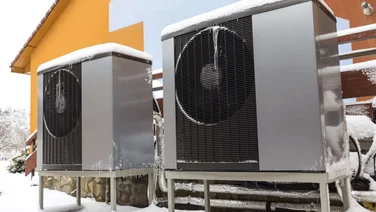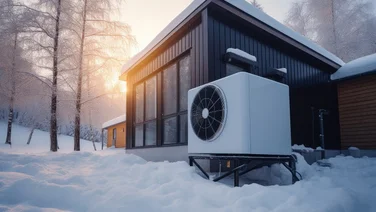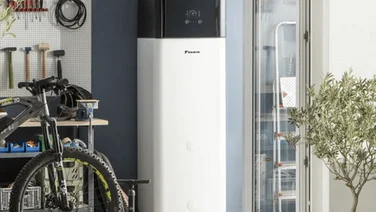We receive a small fee from trusted installers when you request a quote through our site. This helps us keep our content independent, well-researched and up to date – Learn more
- What’s on this page?
- What is a water source heat pump?
- How does a water source heat pump work?
- How is a water source heat pump installed?
- How much does a water source heat pump cost?
- Is your home suitable for a water source heat pump?
- Are there any government grants for water source heat pumps?
- Pros and cons of water source heat pumps
- Are water source heat pumps popular in the UK?
- Summary
This transition away from gas boilers has meant that more people are becoming familiar with different types of heat pumps, heat pump costs, and the benefits they have to offer. However, many people are still in the dark about water source heat pumps.
Think your home would be suitable for a water source heat pump? Find out everything you need to know about them in the article below before investing in a system.
If your home isn’t suitable for a water source heat pump, you can join thousands of UK homeowners by seeing what an air source heat pump costs. To speed up the process, use our easy-to-navigate tool to get bespoke quotes.
All you have to do is provide a few quick details, and our expert installers will be in touch with free heat pump quotes.
What type of central heating do you currently use?
Get started
What’s on this page?
What is a water source heat pump?
A water source heat pump is pretty similar to an air source heat pump, except it uses water to generate warmth, rather than air.
The system extracts heat from a water source and uses it to provide heating to a nearby property. Suitable water sources for this system include:
- Lakes
- Rivers and streams
- Mine water
- Sea water
- Aquifers (an underground layer of water-bearing permeable rock)
This method of heating is much more environmentally friendly than gas and oil boilers because it uses natural surroundings to generate heat, rather than burning fossil fuels.
Water source heat pumps also tend to be more efficient than ground and air source heat pumps because heat transfers better in water. You can expect a high efficiency rating of 300–600%, even on cold winter nights. Water temperatures are generally more stable throughout the year in the UK – averaging at 7°C–12°C, which is higher than the average air and ground temperature in winter.
How does a water source heat pump work?
Water source heat pumps work by extracting heat from a body of water and converting it into energy to heat a property.
It does this by using a series of submerged pipes that run from the water to the property, which absorb the heat from the river, lake, large pond, or borehole.
The exact process will vary depending on the type of water source heat pump you have. We’ve outlined how each type of system works below.
Closed-loop systems
Sealed pipes are filled with fluid, and are submerged beneath the water. Although the fluid in the pipes actually never comes into contact with water directly, it absorbs the heat in the body of water.
The heat energy is then passed through a compressor, which raises the temperature to a usable level and circulates it to the heat distribution system (radiators, underfloor heating, and hot water cylinder) to provide heating and hot water.
This is the more popular water source heating system, as it’s usually cheaper and easier to install.
Open-loop systems
An open-loop system takes water from the source, which flows through the pump to extract its heat, before being discharged back to its source. Open-loop systems differ from closed-loop collectors, as they don’t use a heat transfer fluid – the water itself is the fluid.
These systems can be the more efficient option, but tend to have a shorter lifespan and require higher maintenance because they can be prone to clogging.
Bear in mind that before installing an open-loop system, you’ll need to get consent from either the Environment Agency, or the Scottish Environment Protection Agency (SEPA) if you live in Scotland, to discharge the water, and possibly get additional permission to extract it.
What type of central heating do you currently use?
Get startedWant to get a better idea of what it’s like to own an air source heat pump? Check out our case study with Louise, from South London.
Louise had a 12-kilowatt air source heat pump installed to reduce her reliance on fossil fuels, and received £5,000 off the upfront cost through the Boiler Upgrade Scheme. Now, Louise can enjoy a warm, even temperature throughout the house, without fluctuations.
Take a look at the full interview with Louise to learn more.
How is a water source heat pump installed?
The heat pump unit is installed either inside the property or on the outside of an external wall. The installer will then insert the pipes, which will run from the heat pump unit to the edge of the nearby water source. The pipes need to be buried in a trench around 0.5 metres deep and 40cm wide.
Once the pipes are at the edge of the water, the installer will connect them to a lake collector or a pond mat, which are loops of pipes that are used to circulate a mixture of water and refrigerant.
The collectors are then floated out on the surface of the water to an ideal spot, where they’ll sink and be put in place by weights.
Bear in mind that if you’re getting a water source heat pump, you’ll probably need to install underfloor heating and larger radiators in your property to get the best performance out of the system.
Generally, the installation process should take between one to five days – similar to air source heat pump installation. However, if there are any complications hooking your heat pump unit up to the property, expect it to take longer than this.
To ensure you get the right installer for your home, check out our guide to the best heat pump installers in the UK.
How much does a water source heat pump cost?
A water source heat pump costs around £10,000. However, you can get £7,500 off this amount with the Boiler Upgrade Scheme – but more on that later.
However, this figure will vary, depending on the installer you go with, your location, and whether there are any complications during the installation process.
If you’re tempted to buy a water source heat pump, you should also consider the maintenance costs. Water source heat pumps typically need repairing less frequently than their air-source counterparts.
However, if you get an open-loop system, you’ll need to do regular checks for any blockages.
Is your home suitable for a water source heat pump?
Not all homes will be suitable for water source heat pumps.
If you’re considering getting one of these systems, your property will need to be located near a water source. You’ll also need to make sure there’s enough space between the water source and the property to lay the pipes.
And the more heat you need, the larger the water source you’ll need. If the system doesn’t have enough water, the heat pump will lower the temperature of the water to the point where the water freezes in the pipes.
The property itself will also need room for the system’s compressor. Make sure this is located in an isolated area of the house, as the compressor makes a low humming noise when it’s being switched on and off.
The building will also need to be well insulated, otherwise you won’t feel the benefits from the system, as the heat generated from the heat pump will quickly escape.
If your home isn’t suitable for a water source heat pump, there are other options you can go for, including:
- Ground source heat pumps – A ground source heat pump runs water through pipes underground, which is heated by the earth’s warmth. The water then goes through a heat exchanger, which compresses it and transfers it to the home’s heating system. These systems typically cost between £24,000–£49,000, including installation
- Air source heat pumps – An air source heat pump is a machine that takes air from outside, and uses it to run your home’s heating and hot water systems. These come at an average cost of £10,000
Do you need planning permission?
Most water source heat pumps don’t need planning permission before you install them.
However, some properties – such as listed buildings or properties in conservation areas – will have certain restrictions on what they can install. If this applies to you, check with your local planning department to see if you need permission before starting installing water source heat pumps.
Are there any government grants for water source heat pumps?
If you’d like to buy a water source heat pump, you’ll be pleased to know that you can get financial help from the government to help with the upfront costs.
The government’s Boiler Upgrade System offers a discount of £7,500 on air, water, and ground source heat pumps. However, this scheme is only available for up to 60,000 homes, so you need to act fast if you want to benefit from it.
People eligible for the scheme will need to meet a few simple requirements:
- You must be a homeowner or small business owner
- Your property must be in England or Wales
- The building must have been issued an energy performance certificate (EPC) in the past 10 years
- You must meet certain Energy Performance Certificate scenarios
Want to learn more about the scheme? Head to our page on The Boiler Upgrade Scheme: What You Need To Know.
People in Scotland might also be able to get financial help for their water source heat pump through the government’s Home Energy Scotland Loan.
Pros and cons of water source heat pumps
| Pros | Cons |
|---|---|
| Low-carbon heating method | High upfront costs |
| Quiet whilst operating | Slow return on investment |
| Less groundwork than a ground source heat pump | Only suitable for properties with a sufficient body of water nearby |
| Minimal visual impact | Open loop systems require special planning and permissions |
| Low maintenance | Installation is more difficult than some other home heating solutions |
| Eligible for Boiler Upgrade Scheme | Might not be suitable for listed buildings |
| Lifespan of over 20 years | Homes need to be well insulated |
Are water source heat pumps popular in the UK?
Water source heat pumps are still pretty under the radar in the UK. In fact, much of the UK is still unaware of heat pumps in general. Our annual National Home Energy Survey found that only 54% of UK residents are aware of heat pumps and the benefits they can provide.
However, as the government continues to work towards banning gas boilers, we can expect to see heat pumps become more popular in the UK.
Summary
Water source heat pumps are a great option for people who are located near a body of water and are wanting to reduce their emissions.
This is a slightly niche market. So if your home isn’t suitable for a water source heat pump, don’t panic. You can join the thousands of UK homeowners currently using an air source heat pump.
You can make this process much easier by using our easy-to-navigate tool to get bespoke quotes. All you have to do is provide a few quick details, and our expert installers will be in touch with free heat pump quotes.

